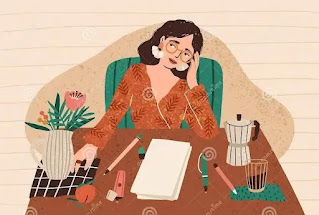Discuss the contribution of Victorian women novelists to the development of the English novel.
Women writers and female characters had been part of novel-writing since the time of Aphra Behn, and it is commonplace that women were the main readers of the genre in the eighteenth century. After Sir Walter Scott made the novel popular worldwide, it was, for two decades, seen largely as a men’s genre. Women writers were expected to write the kinds of the novel which George Eliot was to condemn in an essay as “silly novels by lady novelists” – the sub-genres of romance, fantasy, and sensation. But several of the major figures of the Victorian novel are women, and the heroines they created began to throw off the victim’s roles that male authors had created.
It is a fact that the great tradition of novel writing was set up by Fanny Burney in imitation of the classical masters of the English novels like Richardson and Fielding. The tradition was continued honestly by Mrs. Radcliffe in Gothic romances and Mrs. Mitford in her science-fiction. There were also some other prominent women novel-writers quite popular in their time, such as Mrs. George, Mrs. Trollope. In fact, with Miss Austen the tradition of novel writing by women is found finally established and was continued with equal warmth and zeal, with a high degree of standard and popularity in the Victorian age by the Bronte sisters, “the pioneers in the fiction of that aspect of the human soul” as opined by Edward Albert. Apart from them, Mrs. Gaskell and George Eliot marked historical advancement in the amplitude of situation, range of theme, character portrayal, and humor in Victorian fictional literature.
The Bronte sisters, Charlotte, Emily, and Anne are distinctly romantic in temperament, exploring in their novels extremes of passion and violence. Charlotte Bronte:
Charlotte is noted for four significant novels – Jane Eyre, Shirley, Villette, and The drive Professor. Her novels, all of them, are found impelled with her personal experiences of life which were hardly pleasing to her. Besides intense subjective strain, Charlotte’s novels contain other features such as impulsiveness and a note of revolt against patriarchy. She is deemed to be the first woman novelist to show human impulsiveness and write of life from the woman’s point of view. She strikes a revolutionary sentiment for women against the conventional order, of pioneering the novel of emancipation of the repressed womanhood In Jane Eyre, Charlotte Bronte sends out a signal that ordinary women can experience deep love and begin to take responsibility for their own lives.
Emily Bronte:
The second Bronte sister. Emily Bronte wrote less than Charlotte, but was in some ways, the greatest of the three sisters. Her one novel Wuthering Heights is unique in English literature. It is a novel that contains a degree of emotional force and sophisticated narrative structure, not seen previously in the history of the English. literature. It moves in a tragic circle from relative peace and harmony to violence. destruction and intense suffering, and finally back into peace and harmony again. It is a tare piece of fictional artistry and is an unsurpassable work for its grace of lyrical poetry and magical sublimity. “Emily had attained”, as Samuel C. Chew observes. “the mystical experience in its entirety” in that singular achievement.
Anne Bronte:
The youngest of the Bronte sisters, Anne is less known. Her qualities as a novelist have been much underrated because she shows less vehemence in her approach than her prominent sisters. Yet her Agnes Grey is a moving personal record and reveals the power of observation.
George Eliot:
In the works of George Eliot, the English novel reached new depths of social and philosophical concern and moral commitment. For some twentieth-century critics, Virginia Woolf and F.R. Leavis among them, her writings are seen to have brought the novel to new heights of maturity. She shares with the greatest European writers of her century Balzac, Flaubert, Dostoevsky and Tolstoy a concern for her characters vulnerability and weakness in the face of ‘progress and the moral imperatives of duty and humanity. Her works include Adam Bede, The Mill on the Floss, Romola and Middlemarch, Eliot has a great importance in the history of English fiction for her interest in psychological analysis of the inner consciousness. According to David Cecil. “Her portraits are primarily portraits of the inner man.”
Elizabeth Gaskell:
Mrs. Gaskell stands apart from the Bronte sisters. In the words of David Cecil. “Her sense of humour and deep sympathy are obvious manifestations of her serenity.” Her novels are all marked by the objective view of the real world around them. Her first novel Mary Barton is a vivid presentation of the hard life of the workers under the exploitations of the industrial masters. But Gaskell is outstanding for her novel Ruth where she is concerned with moral problems and psychological complexity.
All the Victorian women novelists contribute a lot to the enrichment of English fiction. Their works are as much the product of imagination and social observation as of the intellect. They are found to be deeply concerned with the primal feeling of womanhood and the inward workings of the human souls at large.
